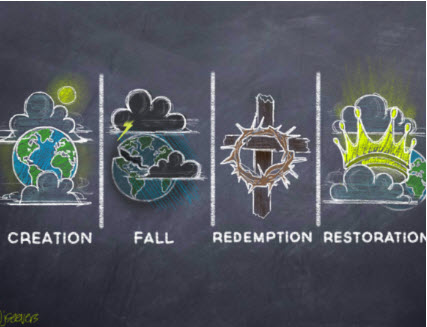In previous letters to the editor of the local newspaper, I have criticized wokeness.
A few readers challenged my understanding of wokeness. Particularly, they criticized my favorite label for wokeness: Neo-Marxism.
Perhaps they want me to use the word “progressive” to describe them. I don’t believe progressives are moving towards anything but increasing societal chaos.
I would be glad to justify the use of the Neo-Marxist label in a future letter by describing the continuity and discontinuity between Marxism and wokeness.
In this letter, though, I will describe the supreme worldview: Christianity. It is the worldview against which all inferior worldviews are to be judged.
When I apply the term “worldview” to Christianity, I do not use the term in some postmodern, milquetoast pluralistic manner.
Biblical Christianity is objective, revealed truth. When properly understood, Scripture provides a coherent, robust explanation of man, his purpose and the current state of affairs.
Be forewarned, though. Emaciated, liberal versions of Christianity are often nothing more than secularism stuffed in a skin of pseudo-Christianity. And, sadly, some genuine Christian fellowships don’t have a well-developed biblical theology robust enough to provide solid answers to existential questions, either. The content of their message needs improvement.
The overview of Scripture can be described in four words: Creation, Fall, Rescue (Redemption), and Restoration (Consummation). Alistair Begg explains the same concept in terms of Good, Bad, New, and Perfect in the video below.
This explanation is sometimes called the “Big Picture”. It focuses on the forest rather than the trees.
Creation is described in Genesis 1-2. Genesis describes the creation of the heavens and the earth from nothingness (ex nihilo), the ordering of it by God, and its population with plants, animals and man.
God created man as a unique creature, in his own image, endowed with attributes analogical to himself, to represent him in the material realm and to glorify him in thought and deed.
God created man male and female. They were commanded to multiply and replenish the earth, filling it with other image-bearers of God, and to maintain the order of the creation.
The family relationship was meant to reflect aspects of God’s image in a communal sense. God is communal and relational by nature. The Trinity doctrine reflects this.
Harmony characterized the pre-Fall relationship between man and God, man and his wife, man and the land, and man and his own body. Life in the presence of God in Eden was true life.
God told man he could eat of all the trees of the garden but one, the tree of the knowledge of good and evil.
Genesis 3 recounts the Fall. Our common parents rebelled against God and took from the forbidden tree. Their natures changed.
Man became alienated from God, fellow man, the earth, and their own bodies.
Man reflected God’s image at creation. After the Fall, this image was shattered or severely marred.
Man’s judgment followed. Man experienced spiritual death, which is separation from the presence of God, the source of life.
God did not leave all mankind in spiritual death, though. He sent his Son to redeem a remnant. Jesus, the sinless, unique, eternal Godman, died a substitutionary death on the Cross to cover the sins of this remnant. Those who repent and place their faith in Christ are resurrected from spiritual death in Adam to receive new spiritual life in Christ. Finally, the consummation occurs when Jesus exercises wrath and judgment upon unrepentant mankind and gathers his glorified saints into the New Heavens and New Earth; a glorified Eden-like creation where righteousness dwells. The Curse is reversed. Revelation 21-22 describes the Consummation.
Secularists scoff at Scripture as a myth. I feel pity for them. They have no coherent, robust explanation for man and his purpose.
There are two great videos on the biblical worldview by two of my favorite teachers in the related content section. I recommend listening to them even if you identify as a Christian. Many professing Christians do not have an accurate biblical worldview.
Comments? Email me at [email protected] or leave a reply below. Respectful comments and questions without expletives will be posted and I will respond to them.
Robert Sparkman
This post is a more detailed version of a letter to the editor that I submitted to the local newspaper. The letter to the editor is referenced in the Related Content section.
Concerning the Related Content section, I encourage evaluating the content with discernment. Some sources of information may reflect a libertarian or non-Christian perspective and I would not agree with all of their values, but in general I think they offer some worthwhile comments and criticisms. I do not necessarily agree with every comment by every person, but in general, I find them to be valuable or I would not include them.
Unlike most mainstream media outlets, I am interested in truth rather than mere partisan propaganda. This blog post reflects my well-considered convictions on the related issues, and provides support for my assertions. I acknowledge the possibility that my understanding of events and information may need refinement and welcome legitimate criticism. Respectful comments and questions without expletives and personal attacks will be posted and I will respond to them.
Comments? Email me at [email protected] or leave a reply below.
RELATED CONTENT
The pdf document below is a more detailed explanation of the big picture of salvation with Scriptural references.
Note: This post is a modified version of a letter to the editor that I submitted to the local newspaper. The letter to the editor in pdf form is below. The article was written under the constraints of 600 words, which is generous for a letter to the editor, but insufficient to address every nuance or facet of complex topics.

